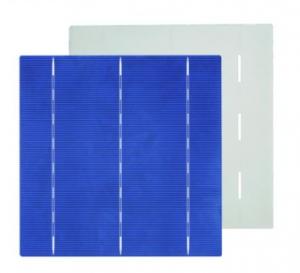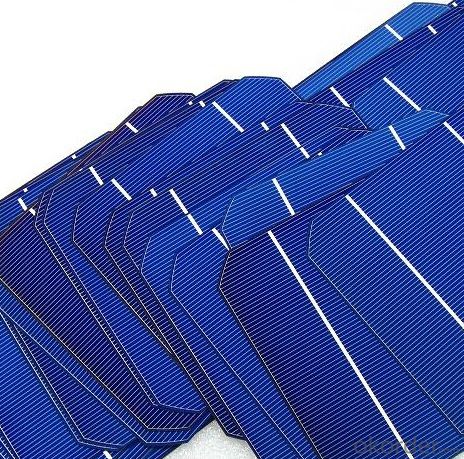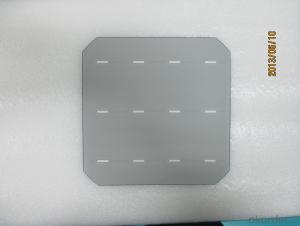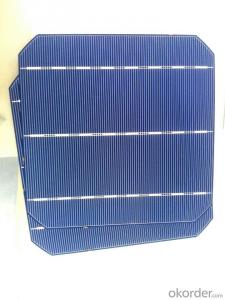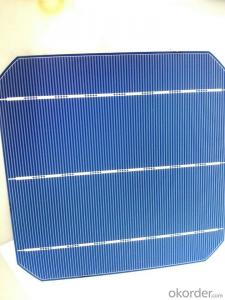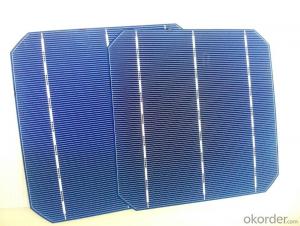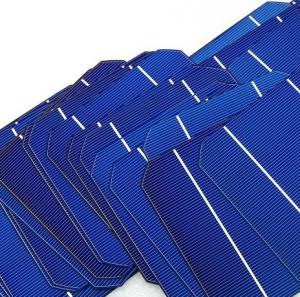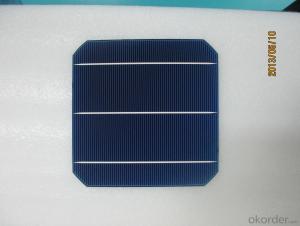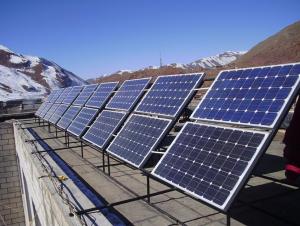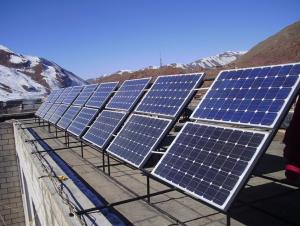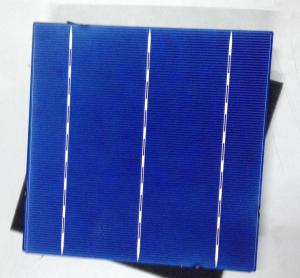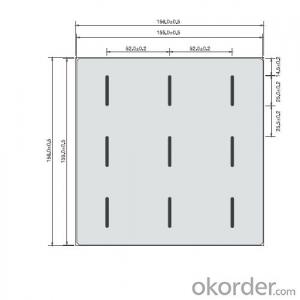Hyundai Solar Cells - Monocrystal Solar Energy Cell 156*156mm 18.5% Efficiency
- Loading Port:
- China Main Port
- Payment Terms:
- TT or LC
- Min Order Qty:
- -
- Supply Capability:
- 1000000 PCS/month
OKorder Service Pledge
OKorder Financial Service
You Might Also Like
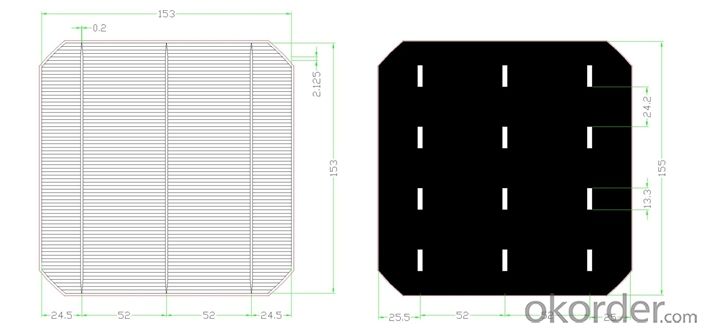
Monocrystal Solar Energy Cell
type:156M
appearance:156×1565㎜±0.5mm;diagonal:R=100mm
Main fence wide:1.5mm back electrode wide:2.8mm
Fence line qty:90
Cell thickness:220um±20um
Eff(%) | 18.00- 18.10 | 18.10- 18.20 | 18.20- 18.30 | 18.30- 18.40 | 18.40- 18.50 | 18.50- 18.60 | 18.60- 18.70 | 18.70- 18.80 | 18.80- 18.90 | 18.9- 19.0 | 19.1- 19.1 | 19.1- 19.2 |
Pm(W) | 4.30 | 4.33 | 4.35 | 4.37 | 4.40 | 4.42 | 4.44 | 4.47 | 4.49 | 4.5 | 4.54 | 4.56 |
Isc(A) | 8.71 | 8.73 | 8.76 | 8.77 | 8.78 | 8.82 | 8.83 | 8.85 | 8.86 | 8.88 | 8.9 | 8.93 |
Im(A) | 8.19 | 8.21 | 8.24 | 8.26 | 8.30 | 8.33 | 8.35 | 8.39 | 8.42 | 8.45 | 8.47 | 8.51 |
Voc(V) | 0.630 | 0.631 | 0.632 | 0.633 | 0.634 | 0.634 | 0.635 | 0.636 | 0.637 | 0.637 | 0.638 | 0.64 |
Vm(V) | 0.527 | 0.528 | 0.529 | 0.531 | 0.531 | 0.532 | 0.534 | 0.534 | 0.535 | 0.536 | 0.537 | 0.538 |
FF(%) | 78.6 | 78.7 | 78.8 | 79.0 | 79.2 | 79.3 | 79.5 | 79.6 | 79.8 | 80 | 80 | 80 |

remark:our company cells as per working current concentrate principle,separate the first and the second grade
Factory Picture of Solar Cells
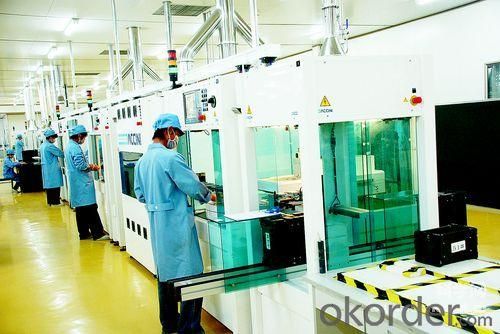
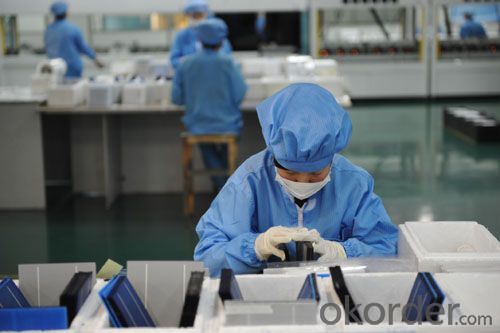
FAQ
We have organized several common questions for our clients,may help you sincerely:
What’s price per watt?
A: It’s depends on the quantity, delivery date and payment terms of the order. We can talk further about the detail price issue. Our products is high quality with lower price level.
Can you tell me the parameter of your solar cells?
We have different series of cells with different power output, both from c-si to a-si. Please take our specification sheet for your reference.
How do you pack your products?
We have rich experience on how to pack the panels to make sure the safety on shipment when it arrives at the destination.
Can you do OEM for us?
Yes, we can.
How long can we receive the product after purchase?
In the purchase of product within three working days, We will arrange the factory delivery as soon as possible. The perfect time of receiving is related to the state and position of customers. Commonly 7 to 10 working days can be served.
- Q: Where and how can I find more information of Photovoltaic Cells Solar Panels? Can anybody share more about that?
- Photovoltaic cell is actually a vital elements in the PV system, without it, the PV system can not function properly and generate the power.
- Q: How big are solar cells?
- Solar cells vary in size depending on their application. They can range from small cells measuring a few centimeters in width and length, commonly used in portable electronics, to larger panels that can be several meters in width and length, used in residential or commercial installations.
- Q: Can the 156x156mm high efficiency single crystal cells assembly function better compared to the traditional one?
- The reason why it is functioning better is because of its h igh power large area silicon solar cell.
- Q: Can solar cells be used in remote areas?
- Yes, solar cells can be used in remote areas. Solar energy can be harnessed and converted into electricity using solar cells, which can then power various devices and systems. Since remote areas often lack access to traditional electrical grids, solar cells provide a viable and sustainable solution for meeting energy needs in such locations. The availability of sunlight in remote areas makes solar energy an ideal and efficient source of power, enabling communities in these areas to have access to electricity for various purposes.
- Q: How much space is required to install a solar cell system?
- The space required to install a solar cell system depends on various factors such as the capacity of the system, the type of solar panels used, and the available sunlight. Generally, a small residential solar system can be installed on a rooftop or an area of about 100-200 square feet, while larger commercial or utility-scale systems can require several acres of land.
- Q: Can solar cells be used for outdoor signage?
- Yes, solar cells can be used for outdoor signage. They are an environmentally friendly and sustainable option that can provide power to illuminate and operate outdoor signs. Solar cells can capture sunlight and convert it into electricity, making them an ideal choice for outdoor signage that is located in areas with ample sunshine.
- Q: How do solar cells impact energy independence?
- Solar cells impact energy independence by providing a renewable and sustainable source of electricity. They reduce dependence on fossil fuels and foreign oil, allowing countries and individuals to generate their own clean energy. Solar cells can be installed on rooftops, in remote areas, or even integrated into buildings, enabling individuals and communities to become self-sufficient and less reliant on centralized power grids. Ultimately, solar cells contribute to reducing carbon emissions and promoting long-term energy independence.
- Q: Can solar cells be used in smart home automation systems?
- Yes, solar cells can be used in smart home automation systems. Solar cells can provide renewable and clean energy to power various devices and systems in a smart home, including lighting, heating, cooling, and even smart appliances. By integrating solar cells into the automation system, homeowners can reduce their reliance on traditional energy sources, lower their electricity bills, and contribute to a more sustainable and environmentally friendly home.
- Q: What is the impact of dust and dirt on solar cell performance?
- The presence of dust and dirt on solar cells can significantly impact their performance. These particles can accumulate on the surface of the cells, reducing the amount of sunlight that reaches the photovoltaic material. This reduces the efficiency of the solar cells in converting sunlight into electricity. Dust and dirt can also create shadows on the cells, causing hot spots and leading to uneven distribution of power production. Therefore, regular cleaning and maintenance of solar panels are crucial to maximize their performance and ensure optimal energy generation.
- Q: Can solar cells store energy for later use?
- No, solar cells cannot directly store energy for later use. They can only convert sunlight into electricity in real-time. However, the generated electricity can be stored in batteries or other energy storage systems for later use.
Send your message to us
Hyundai Solar Cells - Monocrystal Solar Energy Cell 156*156mm 18.5% Efficiency
- Loading Port:
- China Main Port
- Payment Terms:
- TT or LC
- Min Order Qty:
- -
- Supply Capability:
- 1000000 PCS/month
OKorder Service Pledge
OKorder Financial Service
Similar products
Hot products
Hot Searches
Related keywords
